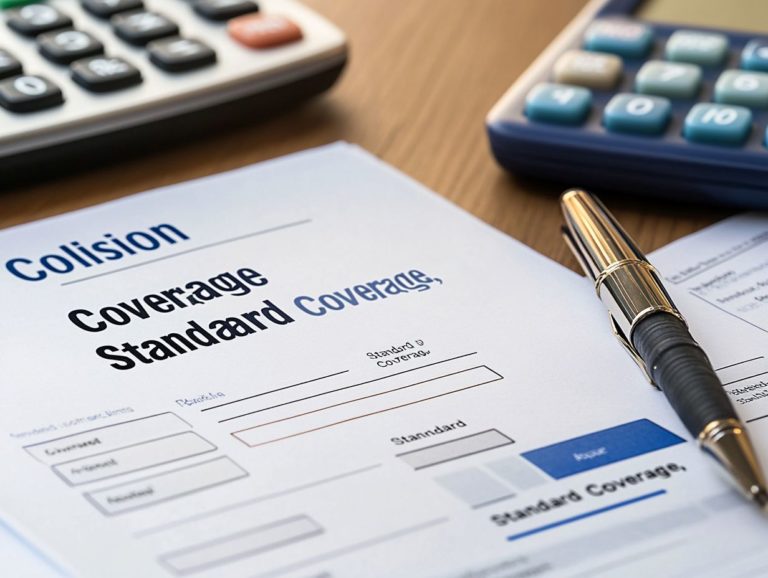5 Tips for Finding the Right Policy for You
Navigating the world of insurance can often feel overwhelming, with countless options and fine print that might leave you feeling confused. Whether you re seeking coverage for your home, car, health, or life, knowing where to begin is essential. Here are five exciting tips to help you find the insurance you need!
We ll also shine a light on common pitfalls to avoid, ensuring you secure the best coverage tailored to your unique situation. Ready to simplify your insurance journey? Let s dive in!
Contents
- Key Takeaways:
- 1. Determine Your Specific Insurance Needs
- 2. Research Different Insurance Companies
- 3. Compare Policies and Coverage
- 4. Consider Your Budget and Payment Options
- 5. Read and Understand the Fine Print
- What Are the Different Types of Insurance Policies Available?
- What Factors Should You Consider When Choosing an Insurance Policy?
- How Can You Determine the Reliability of an Insurance Company?
- What Are the Key Components to Look for in an Insurance Policy?
- How Can You Ensure You Are Getting the Best Coverage for Your Money?
- What Are the Common Mistakes People Make When Choosing an Insurance Policy?
- Frequently Asked Questions
- What are the top 5 tips for finding the right policy?
- How do I determine my specific needs for a policy?
- What should I look for when researching different insurance companies?
- Why is it important to understand the policy details?
- Should I trust online reviews when researching insurance companies?
- Why should I seek professional advice when choosing a policy?
Key Takeaways:

- Determine your specific insurance needs before making a decision.
- Research and compare multiple insurance companies to find the best fit for you.
- Read and understand the fine print to avoid any hidden surprises in your policy.
1. Determine Your Specific Insurance Needs
Determining your specific insurance needs is an essential step in securing your financial future. It ensures you re adequately protected against unexpected events while considering factors like end-of-life costs and family needs. This is especially important for millennials, who may face unique challenges in managing financial security.
To effectively assess your coverage requirements, start by evaluating your family size. A larger family may necessitate more substantial health and life insurance policies. Your income level also plays a significant role; those with lower incomes might need a different approach to shielding themselves from financial burdens.
Don’t forget to factor in existing debts student loans, mortgages, and the like can greatly affect your vulnerability in case of unforeseen incidents. Don t wait to think about future expenses start planning now! This includes potential costs like your children s education or your retirement planning. For millennials, prioritizing health and life insurance early can help you sidestep financial strain down the road.
Consulting with knowledgeable insurance agents or independent advisors can be invaluable. They can help you tailor coverage options to your specific needs and navigate the often-complex landscape of insurance with ease.
2. Research Different Insurance Companies
Researching various insurance companies is crucial for finding the coverage that suits your needs. This process allows you to assess key factors such as client-focused agencies, financial health, and customer service ratings, all of which can significantly influence your insurance experience.
To kick off your search, take the time to examine ratings and reviews from the National Association of Insurance Commissioners (NAIC) and other reputable sources like J.D. Power and Consumer Reports. These platforms offer invaluable insights into the performance of different insurers, particularly in areas like claims handling and customer satisfaction. It s essential to understand how these companies manage claims, as efficient claims processing can greatly reduce stress during challenging times.
Also, the level of customer service provided by an insurer is vital for ensuring a smooth and positive insurance journey.
3. Compare Policies and Coverage
Comparing insurance policies and coverage options is crucial for selecting the best plan tailored to your specific needs. This process enables you to identify potential coverage gaps and grasp the various costs associated with term and variable life insurance.
To streamline your comparison, consider creating a comprehensive chart that outlines key elements like coverage limits, premium costs, and specific benefits offered by each policy. This visual tool allows you to analyze the options side-by-side, shedding light on vital aspects such as policy limits and optional riders additional benefits you can add to your policy for extra protection.
By understanding these details, you enable yourself to pinpoint which features are essential for your situation, leading to a well-informed decision. It s always wise to reach out to an insurance advisor for personalized insights and to clarify any complex terminology that may pop up during your comparison.
4. Consider Your Budget and Payment Options

Considering your budget and exploring payment options is a game-changer when selecting an insurance policy. This helps you maintain financial stability while taking advantage of various discounts and receiving appropriate coverage recommendations.
To optimize costs, carefully evaluate different budgeting strategies. Weigh monthly premiums against potential out-of-pocket expenses for various claims. Annual payments often come with discounts compared to monthly payments, making them an attractive choice if you can pay upfront. If that’s not feasible, spreading costs throughout the year can alleviate financial pressure.
Ask now for available discounts like multi-policy savings or safe driver incentives to save big! By understanding these factors, you can make informed decisions that align perfectly with your unique needs.
5. Read and Understand the Fine Print
Dive into the fine print of your insurance policies to avoid surprises. This knowledge enables you to understand how to file a claim and be aware of any relevant insurance regulations.
Reviewing the policy details can unveil critical rules about what is and isn’t covered that may significantly affect your coverage. For example, many individuals overlook clauses that limit coverage for natural disasters or certain accidents, leading to unexpected out-of-pocket expenses. Lapses in documentation can lead to denied claims.
By paying attention to these details, you can protect yourself from pitfalls that could jeopardize both your financial stability and peace of mind. A thorough review is essential for securing the protection you deserve.
What Are the Different Types of Insurance Policies Available?
Understanding the various types of insurance policies available is crucial for making informed decisions. These policies encompass coverage options, including life insurance such as term life and variable life as well as home, auto, and long-term disability insurance, all tailored to your financial needs.
Each policy serves a distinct purpose and provides vital safety nets for you and your loved ones. For instance, life insurance ensures your dependents have financial security in the event of an untimely death, while property insurance protects your assets like homes and vehicles from unforeseen damage or loss.
Liability coverage helps shield you against lawsuits or claims from third parties, offering peace of mind in both personal and professional spheres.
By grasping these options and their benefits, you can find the right coverage for your needs that align with your life circumstances, paving the way for greater financial stability.
What Factors Should You Consider When Choosing an Insurance Policy?
When selecting an insurance policy, several critical factors come into play. Assess your specific coverage needs, understand the costs associated with different options, and ensure proper beneficiary designation, all while keeping 5 ways to save money while comparing policies in mind, along with policy limits and the underwriting process that insurers use to evaluate your risk.
Your personal circumstances such as age, health status, and lifestyle significantly influence which coverage is most suitable for you. To make the best choice, consider 5 tips for maximizing your coverage while saving, and conduct thorough health evaluations to illuminate potential risks, allowing you to choose policies that resonate with your health needs.
Also, consider the types of coverage that best align with your situation, whether that’s life, health, or property insurance. It’s important to explore ways to optimize your insurance portfolio and not overlook your long-term financial goals, as they will guide you toward policies that offer both stability and growth.
Consulting with an insurance agent can provide personalized advice tailored to these considerations, ensuring that the decisions you make today pave the way for a secure future.
How Can You Determine the Reliability of an Insurance Company?

Determining the reliability of an insurance company is essential for your peace of mind. You can accomplish this by checking ratings from the National Association of Insurance Commissioners and researching agencies with a solid track record.
Look into the financial strength ratings from independent agencies like A.M. Best. These ratings show how well a company can meet its obligations.
Don’t overlook customer reviews on various platforms. These reviews can reveal the company s responsiveness and service quality.
Check the claim settlement history to see how quickly the company resolves claims. This often indicates its reliability.
For a deeper understanding, explore resources like consumer reports and insurance forums. These can help you make informed decisions.
What Are the Key Components to Look for in an Insurance Policy?
When reviewing an insurance policy, focus on key components such as:
- Your coverage needs
- The efficiency of claim handling
- Policy limits
- Recommendations that align with your financial goals
Understanding your coverage needs means looking at your personal circumstances, including your assets and liabilities. This ensures you have adequate protection. For instance, if you’re a homeowner, you might need a policy that covers the full replacement value of your property. A renter may only need liability coverage.
The efficiency of claim handling can greatly impact your experience. Policies with streamlined claims processes tend to alleviate stress during challenging times.
Examining policy limits is essential to avoid coverage gaps that could lead to unexpected costs. Also, considering riders which are additional coverages and optional features can make your policy more relevant to your lifestyle. This helps provide you with peace of mind and financial security.
How Can You Ensure You Are Getting the Best Coverage for Your Money?
Want to save money? Start with thorough policy comparisons! To ensure you re getting the best coverage for your money, conduct comparisons and pinpoint potential coverage gaps. Leverage available insurance discounts to help lower your costs.
Regularly review your insurance policies to stay informed about any changes in your circumstances or the market. Consulting with independent insurance advisors provides valuable insights tailored to your situation.
Understanding the total cost of ownership beyond just the premium payments enables you to make informed decisions that maximize your protection while minimizing unnecessary expenses.
By taking these proactive steps, you ensure that your insurance portfolio remains robust and perfectly aligned with your evolving needs.
What Are the Common Mistakes People Make When Choosing an Insurance Policy?
Many individuals stumble into common pitfalls when selecting an insurance policy. This often happens due to a lack of understanding of their coverage needs, leading to misunderstandings and inadequate evaluations.
As a result, you might underinsure your property or overlook crucial coverage features designed to protect against specific risks. One common mistake is neglecting to compare policies from different providers, which could reveal affordable options with better benefits.
Not reading the fine print can leave you exposed to exclusions that threaten your financial security. To avoid these missteps, it s important to learn as much as you can through thorough research and to seek help from experienced insurance agents.
Frequently Asked Questions

What are the top 5 tips for finding the right policy?
1. Determine your specific needs and budget. Before you start your search for a policy, assess your needs and budget to narrow down your options. For guidance, check out this resource on how to choose the best insurance policy for you.
2. Research different insurance companies. To find the best coverage and rates, consider checking out the top 5 tips for understanding your auto insurance policy and compare policies from various companies.
3. Read reviews and ask for recommendations. Look for online reviews and ask friends or family for their trusted insurance companies.
4. Understand the policy details. Carefully read through the policy to ensure you know the coverage, limitations, and any extra fees. For more guidance, check out how to find the right insurance for your lifestyle.
5. Seek professional advice. If you’re unsure which policy suits you, consult a licensed insurance agent or financial advisor for tips on simplifying insurance comparisons.
How do I determine my specific needs for a policy?
Consider your age, health, assets, and potential risks to identify how to choose coverage that fits your needs and the level of coverage you require.
What should I look for when researching different insurance companies?
When comparing companies, consider their reputation, financial stability, customer service, and claims process.
Why is it important to understand the policy details?
Understanding the policy helps you avoid unexpected surprises regarding coverage, limitations, and costs. This knowledge allows you to make informed decisions about whether the policy meets your needs.
Should I trust online reviews when researching insurance companies?
Online reviews can provide valuable insights, but consider the source and credibility of the review to gauge its reliability.
Why should I seek professional advice when choosing a policy?
A licensed insurance agent or financial advisor can offer expert guidance. They can help you navigate the complex world of insurance to find the right policy for your needs and budget.






